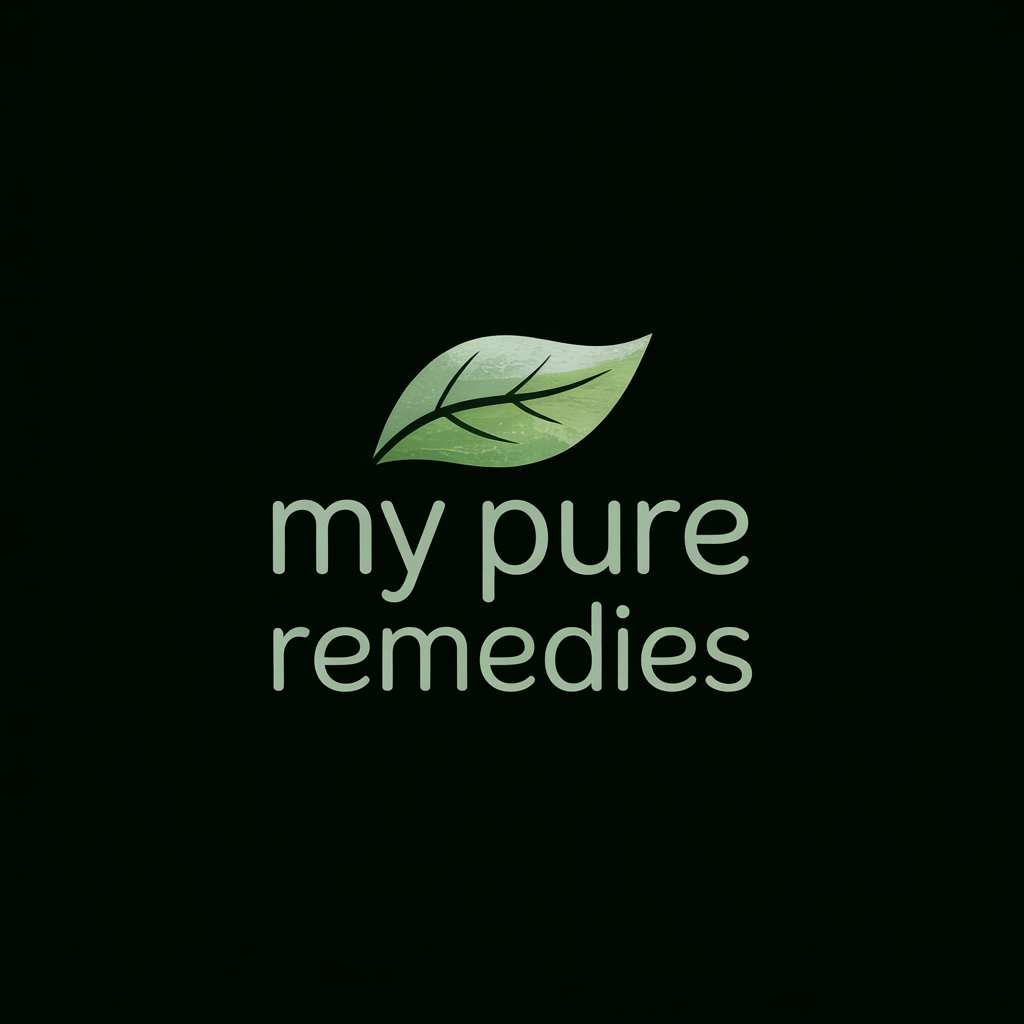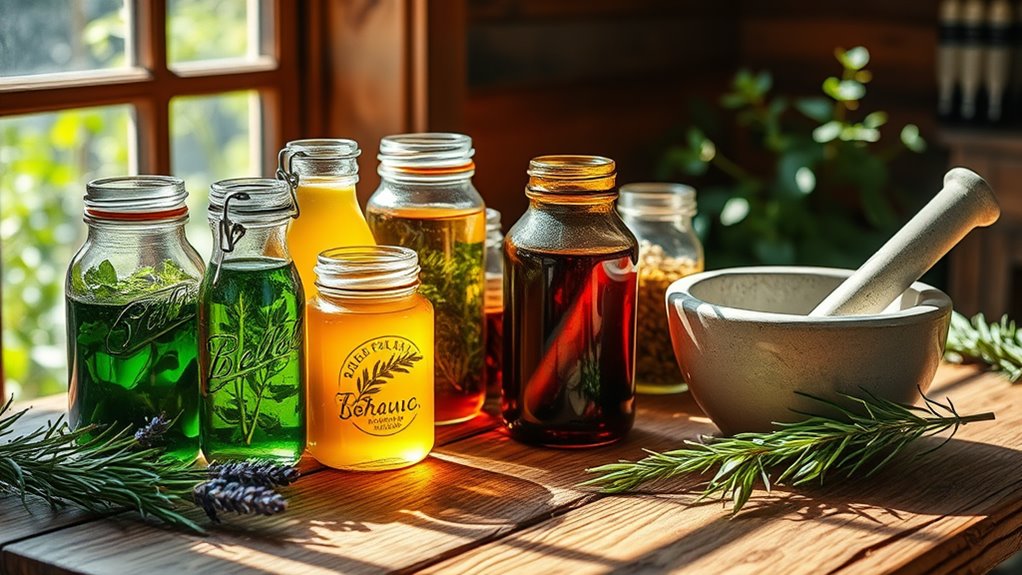Herbal Tinctures for Common Ailments You Can Make
Herbal tinctures are simple to make at home for common ailments. They’re concentrated extracts from herbs that can help with digestion, stress, cold symptoms, and skin issues. You just need to choose your herbs and whether to use alcohol or glycerin as your extracting agent. With the right combination, you can enhance your health effectively. If you want to learn which specific tinctures to prepare for each ailment, there’s plenty more to discover!
Key Takeaways
- Digestive support can be achieved with tinctures like peppermint and ginger for bloating and dandelion root for constipation relief.
- Stress relief may be enhanced through ashwagandha and chamomile tinctures, promoting relaxation and reducing anxiety.
- Immune-boosting tinctures can include echinacea and elderberry, both known for their powerful antioxidant and immune-stimulating properties.
- Soothe cold and cough symptoms with tinctures like marshmallow root for throat irritation and thyme for its antiseptic qualities.
- For pain management, tinctures made with turmeric and willow bark can help alleviate discomfort with natural anti-inflammatory properties.
Understanding Herbal Tinctures
Herbal tinctures are concentrated extracts made from herbs, offering a powerful way to harness the healing properties of plants. You’ll find that these tinctures encapsulate their essence, allowing you to tap into nature’s remedies effortlessly.
You can easily incorporate herbal tinctures into your daily routine, whether you’re seeking relief from anxiety or a boost to your immune system. They’re typically easy to use—just a few drops in water or under your tongue can make a world of difference.
As you explore the world of herbal tinctures, you’ll discover their versatility and potency. For example, herbal tinctures for clarity are particularly beneficial for enhancing focus and energy. Imagine feeling more connected to nature while supporting your health. It’s a beautiful journey worth taking, isn’t it?
Feel empowered as you embrace these herbal allies in your wellness practices.
Ingredients Needed for Tincture Preparation
When preparing herbal tinctures, you’ll need to carefully select the essential herbs that suit your needs. You also need to decide between using alcohol or glycerin as your extracting agent. Each option has its own benefits, so it’s important to choose what works best for you. Additionally, incorporating key herbs known for promoting hormonal balance can significantly enhance the efficacy of your tincture.
Essential Herbs Selection
Choosing the right ingredients is crucial for creating effective herbal tinctures that can help alleviate common ailments.
You’ll want to select herbs that resonate with your needs and offer the benefits you’re looking for. Here are three essential herbs to consider:
-
Echinacea: Great for boosting your immune system and fighting off colds.
-
Chamomile: Perfect for promoting relaxation and aiding digestion.
-
Ginger: Effective for soothing nausea and improving circulation.
Alcohol or Glycerin Options
Deciding whether to use alcohol or glycerin for your tincture affects not just the extraction process but also the overall potency and shelf life.
Alcohol, like vodka or brandy, extracts the full range of herbal properties, resulting in a potent tincture that lasts for years. It’s quick and effective, but if you’re sensitive to alcohol, glycerin is a fantastic alternative.
Glycerin, a sweet, plant-derived syrup, offers a gentler extraction method, making it suitable for kids or those avoiding alcohol. Just keep in mind, glycerin tinctures may not have the same shelf life or potency.
Ultimately, consider your needs and preferences—whichever you choose, your herbal journey will be filled with love and care. Enjoy crafting your personal remedy!
The Benefits of Herbal Tinctures
Herbal tinctures offer you an easy way to enhance nutrient absorption and improve your overall health. You’ll appreciate their simple preparation methods and the convenience of long shelf life. With tinctures, you can enjoy the benefits of herbal remedies without much hassle. Additionally, they may help boost your immunity through the effective extraction of beneficial compounds from herbs.
Enhanced Nutrient Absorption
When you incorporate herbal tinctures into your wellness routine, you may unlock improved nutrient absorption, enhancing the overall effectiveness of your diet.
These powerful extracts can facilitate the uptake of vitamins and minerals, allowing your body to utilize nutrients more efficiently.
Here are a few ways herbal tinctures can help:
-
Bioavailability: Tinctures can increase the bioavailability of nutrients, meaning your body absorbs more of what you consume.
-
Gut Health: Many tinctures support digestive health, ensuring your gut can efficiently break down and absorb nutrients.
-
Synergistic Effects: Combining various herbs in tinctures can create a synergistic effect that amplifies nutrient absorption.
Embrace these concentrated herbal allies, and watch your body’s potential flourish with enhanced nutrient access.
Easy Preparation Methods
Creating your own tinctures can be surprisingly simple, making it easy to incorporate these potent herbal remedies into your daily routine.
Just gather your favorite herbs, high-proof alcohol, and a glass jar. Start by filling the jar with herbs, leaving some room at the top. Pour the alcohol over the herbs until they’re completely submerged. Seal it tightly and give it a gentle shake.
Let it steep in a cool, dark place for about two to six weeks, shaking it occasionally. When it’s ready, strain the mixture through a cheesecloth, and store your finished tincture in a dropper bottle.
You’ll discover the joy of crafting your personalized herbal remedies, fostering a deeper connection to your health and wellness every day.
Long Shelf Life
While you might expect remedies to have a limited shelf life, tinctures stand out for their impressive longevity. With proper storage, these herbal treasures can last for years, making them a reliable addition to your wellness routine.
You’ll love having a stash of tinctures at your fingertips, ready to support you whenever you need them.
- They maintain potency for extended periods, giving you peace of mind.
- Tinctures are easy to store, requiring just a cool, dark place.
- The simplicity of using tinctures means you’re always prepared for life’s little challenges.
Embracing the long shelf life of herbal tinctures not only enhances your natural health journey but also deepens your connection to nature’s healing wonders.
Enjoy the comfort they bring!
Tinctures for Digestive Health
If you’re seeking natural ways to support your digestive health, tinctures can be a potent solution. They’re easy to make and use.
For bloating or indigestion, consider a blend of peppermint and ginger; these herbs work together to soothe your stomach. Just a few drops in water can help ease that uncomfortable feeling. Many people find that herbal teas for bloating can complement tinctures, providing additional relief and promoting overall digestive wellness.
For constipation, try a tincture made from dandelion root—it stimulates digestion and encourages regularity.
If you’re dealing with heartburn, a chamomile tincture may be your friend, calming inflammation and offering relief.
Tinctures for Stress and Anxiety Relief
When stress and anxiety start to weigh you down, herbal tinctures can offer a natural path to relief.
These concentrated extracts harness the calming properties of various plants, helping you reclaim your peace of mind. Here are a few tinctures you might find soothing:
-
Ashwagandha: Known for its adaptogenic qualities, it helps your body manage stress.
-
Chamomile: Often used to promote relaxation and ease tension, perfect for a tranquil evening.
-
Lavender: Its calming aroma not only soothes but can also enhance your sleep quality.
Additionally, incorporating herbal teas into your routine can provide instant stress relief, complementing the benefits of tinctures.
Creating your own tinctures lets you tailor them to your needs, offering both comfort and empowerment.
Embrace the simplicity of herbal remedies, and let nature guide you toward tranquility.
Tinctures for Immune Support
Boosting your immune system can be a game-changer, especially during cold and flu season, and herbal tinctures provide an easy way to support your body’s defenses. You can craft potent blends using herbs known for their immune-boosting properties.
Here’s a quick guide to some herbs you might consider:
| Herb | Benefits | Preparation Method |
|---|---|---|
| Echinacea | Stimulates immune response | Soak in alcohol for 4-6 weeks |
| Elderberry | Rich in antioxidants | Steep in apple cider vinegar |
| Astragalus | Enhances T-cell production | Infuse in vodka for 6 weeks |
| Garlic | Antimicrobial properties | Mash and soak in alcohol |
Each tincture can deepen your connection to nature and bolster your wellbeing. Enjoy creating these remedies that nurture both body and spirit!
Tinctures for Cold and Cough Relief
Cold and cough symptoms can be both annoying and disruptive, but herbal tinctures offer a natural remedy to help alleviate your discomfort. By using the right herbs, you can create your own tinctures that soothe your throat and boost your recovery.
-
Throat-soothing Marshmallow Root: A gentle herb that calms irritation.
-
Echinacea: This powerful herb helps fight off infections and strengthens your immune system.
-
Thyme: Known for its antiseptic properties, it can ease coughs and relax your respiratory system.
Making a tincture is simple and satisfying.
Just remember to give your body the care it needs with these herbal solutions, and embrace the comfort they bring during cold and cough season. You’ll be back to feeling like yourself in no time!
Tinctures for Pain Management
Managing pain can be just as bothersome as battling a cold, but like herbal tinctures for respiratory discomfort, those for pain relief can provide effective support.
You might consider making tinctures using ingredients like turmeric, known for its anti-inflammatory properties, or willow bark, often referred to as nature’s aspirin. Ginger’s warming effects can also help ease aches.
Simply soak your chosen herb in alcohol or vinegar for a few weeks, shake it occasionally, and then strain. When you’re ready, just take a few drops as needed.
These tinctures not only help alleviate discomfort but also connect you to nature’s healing gifts. Embrace this simple process, and nurture yourself with each soothing drop. Your body deserves this care.
Tinctures for Skin Conditions
When it comes to addressing skin conditions, herbal tinctures can offer a natural remedy that’s easy to incorporate into your routine.
They’re not just convenient; they can provide gentle relief for various issues you might face. Here are some tinctures to consider:
-
Calendula: Great for soothing irritation and promoting healing for minor cuts and rashes.
-
Chamomile: Known for its calming properties, it’s perfect for reducing redness and inflammation from eczema or dermatitis.
-
Burdock root: Helps detoxify and can be beneficial for acne-prone skin.
Proper Storage and Shelf Life of Tinctures
Although tinctures are generally stable, proper storage is essential to maintain their potency and effectiveness over time.
To keep your tinctures fresh, store them in a cool, dark place away from direct sunlight and heat sources, like the kitchen or bathroom. Glass dropper bottles work best, as they prevent interaction with plastics that can leach into your tinctures.
You’ll want to seal them tightly to avoid oxidation. Always label each tincture with the date you made it; most last about one to two years.
If you notice any changes in color or smell, don’t hesitate to toss it out. By following these simple steps, you’ll ensure your herbal remedies remain as vibrant and effective as the day you crafted them.

